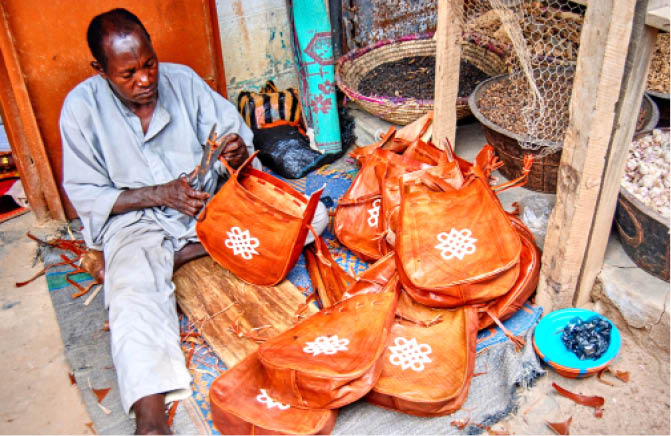As modern tanneries edge out traditional ones, artisans at the kofar Wambai tannery in Kano believe they could do more business if they receive any kind of support from the government, rather than being treated as just a tourist site.
Historically, Kano has always been synonymous with hide and skin. It has been the home of well-tanned animal skins for decades with its famous tannery at Kofar Wambai.
For years, this tannery has served as a tourist attraction. However, recent economic downturn, the rise of modern tanneries, and the availability of cheap imported leather substitutes have reduced the tannery to a shadow of itself.

A recent visit to the tannery revealed a handful of tanned hide and skins, comprising of both domestic and wild animals, displayed in a few stalls. If not for these, the place might have been viewed as an abandoned historical site. Some say even a refuse dump.
Tanning has been an old occupation in Kano with some communities deriving their names from the trade (Majema). And it has always been an old family trade, with skills passed on from father to son across generations.

However, the tanning business has suffered some decline in recent years. Still, it is a common sight for one to see young men and the elderly, busy tanning animal skins in pits filled with chemicals or colours. Others are busy spreading tanned and dyed skins while others prepare mixtures of potash and ashes, in which the skins are soaked. About 300 people depend on the tannery for their living.
According to 78-year-old Malam Uba Babangida, the Kofar Wambai Artisan Tannery was established at its present location 82 years ago. The local tannery has been in existence longer. For about 103 years.
“This place is not the original site where the tannery business started,” he said. “The first place was located away from here by the roadside. Eighty-two years ago, we were moved to this present site. But the business has been in existence for over 103 years,” he said.
Chairman of the tannery’s custodian association under the auspices of Kofar Wambai Multipurpose Cooperative Society, Malam Mustapha Umar Muhammed, said operators of the present tannery inherited the art from their parents, who also inherited it from their forefathers.

Though they are still very much in business, he acknowledges that the tannery has suffered serious declines over the years, especially in its production and trading of tanned hides and skins.
The emergence of modern tanneries has contributed to the decline. Now, Malam Muhammed said, they have been reduced to converting lower grade raw skins into reasonable quality finished leather for the domestic finished leather goods market.
“We operate with some agents who serve as middlemen and our locally made leather are usually taken to Europe and Middle Eastern countries,” he said. “The problem we have observed here is that our products are being presented to the world as Moroccan leather.”
The emergence of mega tanneries in the state has relegated the ancient local artisan tannery to the background.
The impact of the mega tanneries on the small, traditional one was documented in a communiqué issued at a 2016 conference held in Kano.
The conference, organised by Growth and Employment in States (GEMS1), discussed the impact of the Export Expansion Grant (EEG) on the leather industry.
Big enterprises have captured market shares at the expense of midsize and smaller operations in EEG, the communiqué had said.
This has resulted in the closure of most tanneries nationwide including the local ones.
A source in the tannery business said that the grant has reduced the number of operational tanneries in Kano State from over 30 to less than seven.
The communique said that development forced local finished leather goods producers, who have the capacity to consume a significant proportion of locally produced leather, to buy semi-synthetic ones from Asia. This means there is also resultant exportation of jobs, which could have been done by Nigerians.
The local artisans though are still fighting to stay on their feet.
“We are still in this business because this is what we have inherited from our parents, but to be honest with you, the economic situation isn’t helping us,” Malam Muhammed said.
The availability of cheaper synthetic leather from Asia is a major constraint for the tanners. And the fact they don’t have access to the international market means they can’t expand their production, something they think they can do with support from the government or private organisations.
“We have the products with the expertise to produce first-class quality leather, but unfortunately we lack the link to a broader market that will allow our products to stand the competition,” Malam Muhammed said.
The fact that the government sees them as a historical, tourist enterprise does not help the growth of the business.

“The irony here is that we have been converted to a historic site not minding our operational existence. Many diplomats and technocrats have been led here by government officials at various levels and yet, we received nothing in terms of intervention to uplift our business,” he said.
“We can’t continue to watch our product being portrayed as someone else’s. We will also appreciate it if there will be a move to coordinate all local tanners into one location for the possibility of increasing productivity, quality enhancement and broader patronage,” he added.
For Malam Ubale Sani, also a tanner, the irony of the hide and skin business is that it is a gold mine tucked away from millions of Nigerian.
“It is sad to tell you that Nigeria has hide and skin but only a few Nigerians are benefitting from it,” he said.
For the people toiling away at the tannery in Kofar Wambai, their long-suffering gold mine is still profitable. It could still be more, they believe if the right investments are made.

 Join Daily Trust WhatsApp Community For Quick Access To News and Happenings Around You.
Join Daily Trust WhatsApp Community For Quick Access To News and Happenings Around You.

